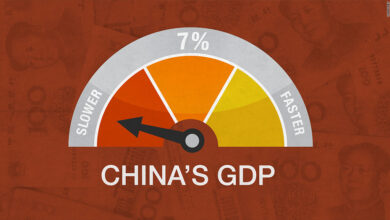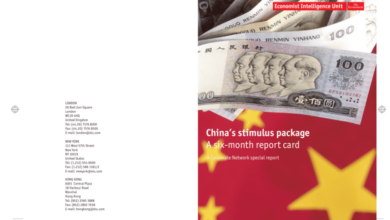Distorted Data A Grave Threat to Chinas Economy
Distorted data is a grave threat to chinas economy – Distorted data is a grave threat to China’s economy. Think about it: how can you make sound economic decisions – whether you’re a multinational corporation considering investment, a local farmer planning next year’s harvest, or the Chinese government itself – if the numbers you’re relying on are fundamentally flawed? This isn’t just about minor inaccuracies; we’re talking about systemic distortions that impact everything from GDP growth figures to inflation rates and employment statistics.
The consequences are far-reaching, affecting not only China’s domestic economic stability but also the global economic landscape.
This post delves into the multifaceted problem of distorted data in China’s economy, exploring its various forms, the underlying causes, its devastating impact on economic planning and foreign investment, and, critically, potential solutions. We’ll examine how intentional and unintentional manipulation of data can skew perceptions, lead to poor policy decisions, and ultimately hinder China’s economic progress. Get ready for a deep dive into a complex issue with significant global ramifications.
Types of Distorted Data in China’s Economy
Distorted economic data in China presents a significant challenge to accurate economic analysis and informed policymaking. The opacity surrounding data collection and reporting, coupled with political pressures, creates an environment where the true picture of the Chinese economy can be obscured. Understanding the types and methods of data distortion is crucial for navigating the complexities of the Chinese economic landscape.
Categories of Distorted Data
Three major categories of distorted data consistently emerge in China’s economic reporting: intentional manipulation for political purposes, unintentional inaccuracies stemming from data collection limitations, and statistical inconsistencies arising from differing methodologies. These categories often overlap, making it difficult to isolate the precise source of distortion.
Methods of Data Distortion
Various methods, both intentional and unintentional, contribute to the distortion of economic data. These range from outright falsification to more subtle biases introduced during the data collection and aggregation processes.
| Method | Description | Impact |
|---|---|---|
| Data Smoothing/Manipulation | Intentional adjustment of data to present a more favorable economic picture, often smoothing out fluctuations or suppressing negative trends. This might involve altering GDP growth figures or inflation rates. | Understates economic volatility, hinders accurate assessment of economic health, and can lead to misallocation of resources. |
| Underreporting of Non-Performing Loans (NPLs) | Banks and financial institutions may underreport the number of bad loans to maintain a positive image and avoid regulatory scrutiny. | Masks the true extent of financial risk within the banking sector, potentially leading to future financial crises. |
| Inconsistent Data Collection Methods | Different regions or sectors may employ varying methodologies for data collection, leading to inconsistencies and inaccuracies in aggregated national statistics. This can be due to a lack of standardized procedures or insufficient resources. | Creates difficulties in comparing data across regions and sectors, limiting the reliability of national economic indicators. |
Consequences of Data Distortion: State-Owned vs. Private Enterprises, Distorted data is a grave threat to chinas economy
The consequences of data distortion manifest differently for state-owned enterprises (SOEs) and privately-owned businesses. For SOEs, data manipulation can mask inefficiencies and losses, hindering necessary restructuring and reforms. The government’s continued support, often based on artificially inflated performance indicators, prevents the market from efficiently allocating resources. This can lead to the accumulation of “zombie” companies – inefficient SOEs that remain afloat due to government intervention, distorting competition and hindering economic growth.In contrast, data distortion affects privately-owned businesses through a less direct but equally damaging mechanism.
Inaccurate macroeconomic data, resulting from broader data manipulation, leads to flawed policy decisions. These policies, based on unreliable information, can negatively impact the business environment for private firms, hindering investment, and creating uncertainty. For example, inaccurate inflation data could lead to inappropriate monetary policy decisions, impacting private sector borrowing costs and investment decisions. Furthermore, the lack of transparency and reliability in official statistics increases the risk for private businesses, making it harder to plan for the future and making investments more uncertain.
Impact of Distorted Data on Economic Planning: Distorted Data Is A Grave Threat To Chinas Economy
Distorted data significantly undermines the effectiveness of economic planning in China. The consequences ripple through various sectors, affecting policy decisions, resource allocation, and ultimately, the overall economic health and social well-being of the nation. Accurate data is the bedrock of sound economic planning; its absence or distortion leads to flawed strategies and potentially disastrous outcomes.
Effects of Inaccurate GDP Figures on Government Policy Decisions
Inaccurate GDP figures, whether intentionally or unintentionally skewed, can lead to a cascade of flawed policy decisions. The government relies heavily on GDP growth rates to set targets for various sectors, allocate resources, and justify policy initiatives. Overestimating GDP growth, for instance, might lead to overly ambitious investment plans, potentially resulting in wasted resources and unsustainable debt levels.
Conversely, underestimating GDP growth could lead to insufficient investment in crucial infrastructure projects or social programs, hindering long-term economic development.
- Misallocation of Resources: Overstated GDP growth can lead to excessive investment in sectors that are not performing as well as initially believed, diverting resources from more productive areas.
- Unsustainable Debt Levels: Overly optimistic GDP projections can lead to increased government borrowing, creating unsustainable debt burdens if the actual growth fails to materialize.
- Ineffective Policy Interventions: Policies designed to stimulate growth based on inaccurate GDP data may prove ineffective or even counterproductive, exacerbating existing economic imbalances.
Impact of Distorted Inflation Data on Monetary Policy Effectiveness
Distorted inflation data directly impacts the effectiveness of monetary policy. If the reported inflation rate is lower than the actual rate, the central bank might maintain a loose monetary policy, potentially fueling further inflation and creating asset bubbles. Conversely, if the reported inflation rate is higher than the actual rate, the central bank might implement contractionary monetary policies, unnecessarily slowing down economic growth and increasing unemployment.Consider this scenario: Suppose the official inflation rate is reported at 2%, while the actual inflation rate is closer to 5%.
The central bank, believing inflation is under control, maintains low interest rates. This leads to increased borrowing and spending, further fueling the already high inflation. The result is a surge in prices, eroding purchasing power and potentially leading to social unrest.
Effects of Unreliable Employment Data on Social Welfare Programs
Unreliable employment data directly affects the design and implementation of social welfare programs. If unemployment is underestimated, the government might underfund unemployment benefits, job training programs, and other crucial social safety nets. This can lead to increased social inequality and hardship for those who are unemployed or underemployed.
- Inadequate Funding for Social Programs: Underestimation of unemployment leads to insufficient funding for programs designed to support the unemployed, resulting in inadequate benefits and limited access to job training.
- Increased Social Inequality: The lack of adequate support for the unemployed exacerbates existing social inequalities, potentially leading to increased poverty and social unrest.
- Ineffective Targeted Interventions: Policies aimed at addressing unemployment may miss their mark if the data used to inform them is inaccurate, leading to inefficient resource allocation and limited impact.
Impact of Distorted Data on Foreign Investment
Inaccurate data significantly impacts foreign investment decisions in China. The lack of reliable information creates uncertainty and risk, potentially deterring investors and leading to a misallocation of capital. This effect is amplified in sectors like renewable energy and technology, where transparency and accurate reporting are crucial for attracting sustainable investment.Distorted data undermines investor confidence, leading to reduced foreign direct investment (FDI) flows and hindering China’s economic growth.
The consequences extend beyond immediate investment decisions, impacting long-term economic planning and sustainable development.
Distorted data poses a serious risk to China’s economic stability, undermining accurate planning and resource allocation. This issue highlights the global challenge of data integrity; consider the implications of enhanced privacy, as seen in the news: fbi deeply concerned after apple says nearly all icloud data now has end to end encryption , which could impact investigations reliant on accessible data.
Ultimately, the fight against inaccurate information is crucial for China’s continued economic growth.
Distorted Data and Foreign Direct Investment
The following table illustrates how different types of distorted data affect foreign investors’ perceptions and ultimately influence FDI decisions.
| Data Type | Distortion | Investor Perception | FDI Impact |
|---|---|---|---|
| GDP Growth Rates | Overestimation | Inflated market expectations, potential for overinvestment | Initially increased FDI, followed by potential correction and capital flight when the truth emerges. |
| Environmental Data | Underreporting of pollution levels | Increased risk of environmental liabilities, reputational damage | Reduced FDI in environmentally sensitive sectors, particularly from ESG-focused investors. |
| Infrastructure Data | Inaccurate reporting on capacity and quality | Uncertainty about logistics, operational costs, and market access | Delayed investment decisions, higher risk premiums demanded by investors. |
| Labor Market Data | Underreporting of unemployment or wage discrepancies | Miscalculation of labor costs, potential for social unrest | Reduced FDI in labor-intensive industries, potentially leading to relocation of production elsewhere. |
Environmental Performance and Sustainable Investments
Distorted environmental data significantly impacts foreign investors’ decisions regarding sustainable investments. For example, underreporting of pollution levels or the lack of transparency in environmental regulations can lead investors to underestimate the environmental risks associated with a project. This can result in a reluctance to invest in projects that align with Environmental, Social, and Governance (ESG) criteria, even if the underlying economic potential is high.
Companies with strong ESG commitments are increasingly scrutinizing environmental data, and inaccuracies can lead them to avoid investments in China, potentially diverting funds to other countries with more transparent environmental reporting. This is particularly evident in renewable energy projects, where accurate data on resource availability and environmental impact are crucial for attracting investment.
Misallocation of Capital
Distorted data can lead to a significant misallocation of capital in China’s economy. For instance, if economic growth figures are artificially inflated, investors might overestimate the potential returns of certain projects, leading to excessive investment in those areas. Conversely, if data on environmental or social issues are understated, investors might overlook significant risks, leading to investment in projects that ultimately prove unsustainable or socially damaging.
This misallocation of resources not only hinders efficient economic growth but also increases the risk of financial losses for investors and potentially destabilizes the economy in the long run. The 2008 global financial crisis offered a stark example of how misallocation of capital due to inaccurate data can have far-reaching consequences. While not directly related to China’s data distortion, the subprime mortgage crisis demonstrated how inaccurate assessments of risk, based on flawed data, can trigger a domino effect with devastating consequences.
Sources and Mechanisms of Data Distortion
The distortion of economic data in China is a complex issue stemming from a confluence of factors, including institutional weaknesses, political pressures, and the inherent challenges of data collection in a vast and diverse economy. Understanding the sources and mechanisms of this distortion is crucial for developing effective solutions and improving the accuracy and reliability of Chinese economic statistics.The generation and dissemination of distorted economic data involves a network of actors, each playing a role in shaping the final figures.
China’s economic planning is seriously hampered by distorted data; accurate figures are crucial for effective policymaking. To help us uncover the truth behind the numbers and analyze these critical trends, we’re hiring a senior producer – check out the details at were hiring a senior producer – because tackling this issue requires a team dedicated to uncovering the real story behind China’s economic growth.
Without reliable data, informed decisions are impossible, leaving China’s economy vulnerable.
Local government officials, tasked with meeting ambitious growth targets, often have strong incentives to inflate GDP figures or underreport negative economic indicators. State-owned enterprises (SOEs), facing pressure to perform, may also participate in manipulating data to present a more favorable picture to superiors. Statistical bureaus, at both the national and local levels, also play a critical role, and while they aim for accuracy, they can be influenced by the pressures exerted upon them.
Finally, independent analysts and researchers, while striving for objectivity, often find access to primary data sources limited, making independent verification challenging.
Institutional Weaknesses Contributing to Data Distortion
China’s statistical system, while undergoing continuous improvement, still faces significant challenges. One key weakness is the reliance on administrative data, collected primarily from government agencies and SOEs. This reliance introduces inherent biases, as the data is often generated by entities with vested interests in presenting a positive picture. The lack of robust independent verification mechanisms further exacerbates the problem.
Another significant weakness is the lack of transparency and accountability in the data collection and reporting process. This lack of transparency makes it difficult to identify and correct errors or instances of deliberate manipulation. The relatively low level of statistical literacy and capacity among some data collectors also contributes to inaccuracies.
Distorted data poses a serious challenge to China’s economic planning and accurate assessment of growth. Understanding the complexities of economic manipulation highlights the need to consider broader geopolitical factors, such as the limitations imposed on nations attempting independent action, as explored in this insightful article on the limits of Turkey’s strategic autonomy. Ultimately, the accuracy of economic data, whether in China or elsewhere, is crucial for effective policymaking and sustainable growth.
A Plan to Address Weaknesses in Data Collection
One crucial step towards addressing these institutional weaknesses is strengthening the independence of statistical bureaus. This can be achieved through several measures: increasing their budgetary independence to reduce their reliance on funding from other government agencies, implementing stricter internal controls and auditing procedures to ensure data integrity, and promoting a culture of transparency and accountability within the bureaus themselves. Specifically, a phased implementation of a system of independent audits, conducted by external experts with no affiliation to the agencies whose data they are auditing, could be rolled out.
This would begin with a pilot program focusing on a smaller region or sector, allowing for refinement of methodologies and assessment of effectiveness before nationwide implementation. This would increase public confidence in the accuracy of the data, encouraging greater trust and collaboration in the long term.
The Role of Political Pressure in Data Reporting
Political pressure plays a significant role in shaping data reporting practices in China. Local officials are often evaluated and promoted based on their region’s economic performance. This creates a strong incentive to inflate GDP figures and downplay negative economic indicators, aligning with the centrally set economic targets. For example, during periods of rapid economic growth, there have been instances of local governments reporting unrealistically high growth rates, exceeding the national average considerably.
Conversely, during economic slowdowns, there is a tendency to underreport negative indicators, such as unemployment rates or bad debt levels, to maintain a façade of stability and avoid negative political repercussions. The pressure to meet pre-determined targets often overrides the need for accurate data reporting.
Mitigating the Effects of Distorted Data
The pervasive issue of distorted data in China’s economic reporting poses a significant challenge to accurate economic planning and sustainable growth. Addressing this requires a multi-pronged approach focusing on improved data collection, enhanced transparency, and robust independent verification. This involves systemic changes across various levels of government and industry, demanding a commitment to accuracy and accountability.Improving Data Collection Methods in China’s Economic Reporting requires a comprehensive overhaul of current practices.
This involves not only updating technological infrastructure but also reforming the incentives and accountability structures within the data collection process itself. A more robust and reliable system is crucial for informed decision-making and effective policy implementation.
Strengthening Data Collection Methods
The current system suffers from several weaknesses, including inconsistent methodologies across different reporting units, inadequate training for data collectors, and insufficient resources allocated to data quality control. A comprehensive plan to address these issues is needed. This plan should encompass:
- Standardization of methodologies: Implementing a uniform set of standards and guidelines for data collection across all sectors and regions. This ensures consistency and comparability of data. Examples include adopting internationally recognized accounting standards and statistical methodologies.
- Investing in technological infrastructure: Upgrading data collection systems to incorporate modern technologies, such as cloud computing and big data analytics, to improve efficiency and accuracy. This also allows for real-time data monitoring and anomaly detection.
- Enhanced training and capacity building: Providing comprehensive training to data collectors on standardized methodologies, data quality control techniques, and the ethical implications of data manipulation. This should include regular refresher courses and ongoing professional development opportunities.
- Improved data validation and verification procedures: Establishing rigorous internal checks and balances within reporting units to ensure data accuracy before submission. This involves cross-checking data from multiple sources and employing statistical methods to identify inconsistencies or outliers.
Enhancing Data Transparency and Accountability
Transparency and accountability are crucial for building trust in economic data and fostering a culture of data integrity. Strategies to enhance these aspects include:
- Publicly accessible databases: Establishing easily accessible online databases containing detailed economic data, allowing for independent scrutiny and analysis. This should include metadata describing data collection methodologies and limitations.
- Regular publication of data quality reports: Issuing periodic reports that assess the quality of economic data, highlighting areas of strength and weakness, and outlining plans for improvement. This should include detailed information on data validation and error rates.
- Independent data audits: Conducting regular independent audits of economic data by reputable external organizations. These audits should assess the completeness, accuracy, and reliability of the data, and their findings should be made publicly available.
- Strengthening whistleblower protection: Implementing robust mechanisms to protect individuals who report instances of data manipulation or fraud. This encourages the reporting of irregularities and helps maintain data integrity.
The Role of Independent Auditing and Verification
Independent auditing and verification play a crucial role in ensuring the quality and reliability of economic data. This process involves external experts reviewing data collection methods, assessing data quality, and identifying potential biases or inaccuracies. The outcome strengthens public trust and informs policy decisions.
Independent Auditing and Verification Process
The flowchart depicts a simplified version of the process. In reality, it is far more iterative and involves multiple feedback loops and detailed reviews.
International Implications of Distorted Data
China’s economic data, often cited as opaque and potentially unreliable, has significant repercussions extending far beyond its borders. The inaccuracies and inconsistencies in reported figures impact global economic models, international trade negotiations, and the stability of global financial markets, creating uncertainty and potentially fueling economic instability worldwide. This distortion creates a ripple effect, influencing investor confidence, policy decisions, and the overall global economic outlook.The impact of distorted Chinese economic data on global economic forecasting models is substantial.
Many global forecasting models incorporate Chinese economic data as a key input. When this data is inaccurate, the resulting forecasts are inherently flawed. This leads to misallocation of resources, incorrect policy recommendations, and potentially misguided investment decisions by both governments and private entities. For instance, overestimation of China’s growth rate could lead international organizations to predict higher global growth, potentially delaying necessary adjustments to monetary or fiscal policies.
Conversely, underestimation could lead to overly pessimistic global forecasts, impacting investor sentiment and hindering economic recovery. These inaccuracies directly affect the reliability and predictive power of models used by international organizations like the IMF and the World Bank, and also by private sector analysts.
China’s Data Distortion and International Trade Negotiations
Distorted Chinese economic data significantly complicates international trade negotiations. Accurate data is crucial for determining fair trade practices, assessing the impact of tariffs and other trade barriers, and negotiating mutually beneficial trade agreements. If China’s reported trade surpluses or deficits are inaccurate, it can lead to unfair trade practices, with countries potentially imposing retaliatory tariffs based on flawed information.
For example, if China underreports its exports, other countries might perceive an unfair trade advantage, leading to trade disputes and potentially escalating tensions. Similarly, inaccurate data on domestic production and consumption can skew the assessment of market access and the need for trade liberalization measures. The lack of transparency and verifiability in China’s data makes it challenging to establish a level playing field for international trade, hindering effective negotiations and fostering mistrust among trading partners.
China’s Data Distortion and International Financial Markets
The impact of China’s data distortion on international financial markets is equally significant. Inaccurate economic data can mislead investors about the true state of the Chinese economy, impacting investment decisions and potentially leading to market volatility. For instance, if China underreports its debt levels, investors might underestimate the risks associated with investing in Chinese assets, leading to potentially excessive investment and subsequent market corrections when the true situation becomes clearer.
Similarly, inaccurate data on inflation or economic growth can lead to mispricing of assets, creating opportunities for speculative trading and potentially contributing to financial instability. This lack of transparency can lead to sudden shifts in capital flows, affecting exchange rates and potentially triggering crises in other interconnected economies. The opaque nature of Chinese data makes it difficult for international investors to accurately assess risk and make informed investment decisions, thus contributing to increased market uncertainty.
Potential for Distorted Data to Undermine Global Economic Stability
The cumulative effect of distorted Chinese economic data poses a significant threat to global economic stability. The inaccuracies ripple through global economic models, influencing policy decisions and investor sentiment. This can lead to misallocation of resources, increased market volatility, and potentially trigger larger economic crises. The lack of transparency and verifiability in Chinese data also undermines international cooperation and trust, hindering the ability of countries to effectively manage global economic challenges.
The potential for unforeseen consequences stemming from flawed economic data is considerable, making it a matter of increasing concern for global economic governance and stability. A lack of reliable information from a major global economic player increases uncertainty and makes it harder to coordinate effective responses to global economic shocks.
The pervasive problem of distorted data in China’s economy poses a significant threat to its continued growth and stability. From flawed GDP figures influencing government policy to unreliable employment statistics impacting social welfare, the consequences are wide-ranging and far-reaching. While addressing this challenge requires a multi-pronged approach encompassing improved data collection methods, enhanced transparency, and independent auditing, the ultimate goal is clear: fostering a data ecosystem built on integrity and accuracy.
Only then can China truly unlock its economic potential and contribute meaningfully to the global economy.





